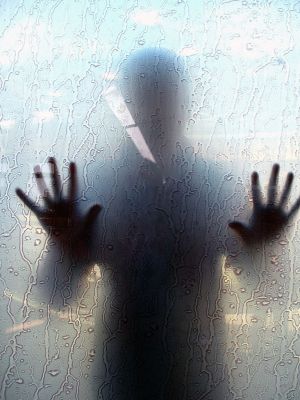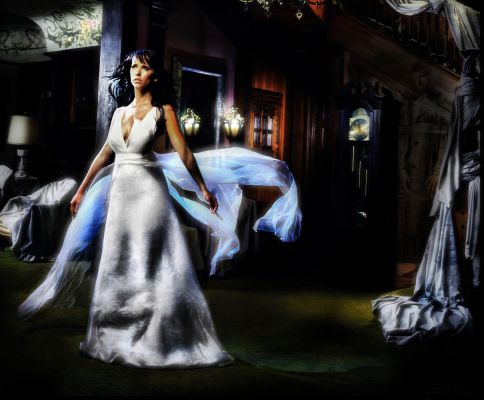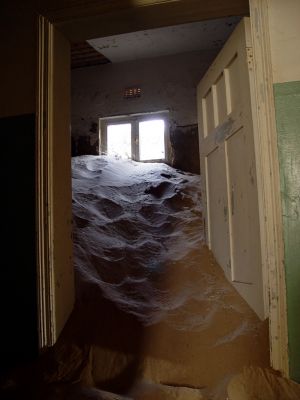
image: piccadilly wilson
It's Halloween time, and the blogosphere is thick with ghosts. (Not those ghosts.) They seem to be staging a comeback as well in popular media, perhaps as a sign of the general anti-science trend that's been befogging American culture for much of the last decade. Gone, however, are the drafty houses and niter-encrusted mausoleums that used to be the favorite haunts of our nearly departed. Your thoroughly modern ghost would rather spend his time inside a particle collider.
A candelit walk through the internet turns up psychics using Q.M. to explain ghosts ("This is not non-science . . . One only has to look at physics--especially quantum physics . . ."), spiritualists using Q.M. to explain ghosts ("Also through this research we may find some kinds of Ghosts that are not Ghosts at all in the way we normally think of them, but an event of time/space distortions or other quantum phenomena . . .") and various essays linking Q.M. to the supernatural ("Surprisingly, only about 30 years later, Le Conte's axiom was shattered by the discoveries of quantum mechanics, which introduced, quite literally, a 'supernatural' element into science.") One well-done site fairly scoffs at the yokels who believe in ghosts without proper training in modern science: "Let's bring ghost hunting out of the Dark Ages and into the light of today . . . Whereas the laws of classical physics only apply to the physical universe, the laws of quantum physics apply to the afterlife as well . . ."
So what could our spectral friends be doing drifting among the corridors of high-energy physics departments?
The first-blush answer is probably the right one. There was a time when radio was new, and it was naturally enough assumed that so bizarre a phenomenon as invisible waves that carry voices must have ties to the uncanny. Ghostly speech was thought to come through radio, and later television, static - not true, although around one percent of the flashes you see on a T.V. set to an open channel is CMBR. In the internet age, that old battery-operated Panasonic no longer seems a likely vehicle for rending the misty veil between worlds. Now, evidently, we have to appeal to quarks for that.
The equation here seems to be that quantum mechanics is weird--no debate on that one--and therefore must have something to do with ghosts, which are also weird. Also, nobody really understands quantum mechanics, right? So there's an "anything goes" quality to the term. Merely invoking the word "quantum" can make the vague, or even vacuous, sound scientific. Just tonight I was at a lecture by an accomplished physician who, midway through an otherwise excellent talk on the health benefits of meditation, started discoursing offhandedly on Near Death Experiences as compelling evidence of how our bodies are only temporary containers for immortal this and that. In other words, the supernatural.
As soon as he left the realm of double-blind experiments and started invoking "pure energy" (is there impure energy?) I knew quantum mechanics couldn't be far behind, and indeed, the good but, I fear, gullible doctor was asserting that subatomic physics has proved all these wooly metaphysical claims just as I and a few disappointed others were slipping out the door.
To an extent, one can only be sympathetic. Quantum mechanics *is* weird, truly weird, and the foundation it has revealed is literally unfathomable to our macroscopic brains. We evolved to think about huge concatenations of atoms, and no part of our actual consciousness is equipped to handle them one at a time. We can say the words "wave/particle duality," we can even build functioning technology based on the equations, but in a fundamental way the idea that the same electron can be in two places at once is never going to make sense.
At the atomic and subatomic level, we are simply out of luck: no one will ever "get" quantum mechanics in the way we can get mechanics. FQXi grantees are working on this issue right now, but we may ultimately have to proceed *as if* we understood what the equations mean, and leave it at that.
By comparison, a dead person who pops back out of the grave seems pretty tame fare.

image: Asian186
Still, ghosts may be more interesting than they seem at first gasp. They touch on several Foundational issues, such as the nature of consciousness (Can it be divorced from its neural substrate--that is, can there be minds without brains? What about Boltzmann brains?) and the question of whether the reality we experience is "ground level," is riding on a deeper reality that is itself ground level, or is one in an ongoing series of levels (what we might call "infinite regress reductionism"). When Edith Wharton wrote the creepy little gem "Afterward," she imagined that a dying man might be both in his deathbed and standing at the side of his killer, a feat of bilocation that puts the double-slit experiment to shame. When Charles Dickens wrote "The Signal-Man," in which a ghost warns a speeding train of disaster, he imagined a world in which information can flow backwards through time -- suggesting that the future is somehow both fixed (the ghost knew what was going to happen) and unfixed (the ghost prevented its happening). That's a version of what cosmologists call the "grandfather paradox," and in less gothic terms underlies one of the fundamental objections to time travel. This is significant stuff.
The problem, of course, is that it's not rigorous. Technically, one can't assert that there is no "supernatural order," because positive assertion shifts the burden of proof onto those making the claim, and it is impossible to prove a negative. No matter how far we look, there might always be some supernatural thing just around the next nebula, so the final proof will elude us. (To see why this is the case, choose any improbable bogie - say a Pixie - and ask how you would *prove* there are no such things.) Rather, we await evidence in support of the claim from those who would assert that supernatural events do, indeed, occur. Until such evidence has been produced, the rational position of default is not to assume any such entities are around.
But even this quick run-down oversimplifies the situation with regard to ha'nts. Some housecleaning would have to be done at the start, before we could even begin to test for ghosts the way all those "scientists" do on television. For example, can the concept of "ghost" be coherently defined? A "living dead person," like a "person without a physical body," is pretty clearly another round square--we can put the words together, but that's no guarantee they hold meaning. Of what substance are ghosts composed? Even such mysterious things as neutron stars (typhoons, brains, the stock market) are made of smaller units we can roughly identify -- how about ghosts? If the ghost hunters say "energy," what precisely does that term mean in this context? Electromagnetic energy? Gravitational energy? What?
Assuming for the moment that a plausible definition could be reached, the issue would turn, like any other, on what actual evidence there is that such entities do indeed stalk the earth. The point is, that's the case with any Deep Question, from the ones FQXi works on to the ones we debate on Halloween night, when the wind picks up and the dry leaves rattle against our windowpanes. If evidence can be found, by all means let's examine it. Demonstrate that consciousness extends past brain death and I guarantee you won't need FQXi to fund your research.
Only real, scientific data counts, though. Merely dimming the lights and invoking Q.M. won't do.

image: Coda